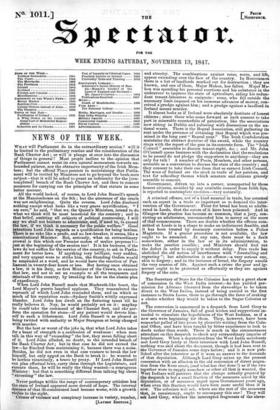NEWS OF THE WEEK.
WHAT will Parliament do in the extraordinary session ? will it be limited to the preliminary routine and the consideration of the Bank Charter Act ; or will it plunge at once into the discussion of things in general ? Most people incline to the- opinion that Parliament cannot resist its own natural momentum towards un- bounded palaver, nor the obtrusive importunity of the Irish Mem- bers; but the official Times persists in maintaining that Parlia- ment will be invited by Ministers not to go beyond the bank-note subject—that it will be asked to grant an indemnity for the [con- ment will be invited by Ministers not to go beyond the bank-note subject—that it will be asked to grant an indemnity for the [con- templated] breach of the Bank Charter Act, and then to concert measures for carrying out the principles of that statute in some better manner.
All the world looked, of course, to Lord John Russell's speech at the Mansionhouse on the 9th ; but the utterance of the oracle was not enlightening. Quite the reverse. Lord John disclosed nothing except what looks like a very grave mystification. ig I am sure," he said, "that we, the Queen's Ministers, intend to do what we think will be most beneficial for the country ; and in that belief, omitting all subjects of political controversy, I will say we shall not hesitate to administer, and, if need be, to exceed the law, if we think it necessary for the public welfare." Good intentions Lord John regards as a qualification for being lawless. There is no rake like a prude, and no law-breaker, it seems, like a constitutional Minister. But, seriously, what an extraordinary avowal is this which our Premier makes of malice prepense l- jtist t the beginning of the session tool It is his business, if the laws do-not suffice for the service of the countrT, to ask in Parlia- ment for better laws. If anything very brilliant, very sudden, and very urgent were to strike him, the Standing Orders would be suspended at a word, and he would have the sanction of Par- liament in twenty-four hours or less. But having once obtained a law, it is his duty, as first Minister of the Crown, to execute that law, and not to set an example to all the trespassers and criminals of the country, by breaking the law on the elastic plea of expediency.
When Lord John Russell made that Macheath-like boast, the Lord Mayor's guests laughed applause. They remembered the reproach of which Lord John reminded them, and on which so intich of his reputation rests---Sydney Smith's wittily expressed blunder. Lord John has dwelt on the flattering taunt till he really believes it. Nay, he would probably act on it : mayhap he would take the command of the Channel fleet, and eke per- form the operation for stone—if any patient would devote him- self to such a lithotomist. Lord John Russell is as pleased at being twitted with audacity as Major Sturgeon at being charged with murder.
But the best or worst of the joke is, that what Lord John takes for a boast of strength is a confession of weakness : when men talk in this way of "exceeding" the law, they mean falling short of it. Lord John alluded, no doubt, to the intended breach of the Bank Charter Act ; but in that case he did not exceed the law—he flinched from maintaining it, because there was a noise. Besides, he did not even in that case venture to break the law himself, but only egged on the Bank to break it : he wanted to be lawless vicariously, a bravo by proxy. If Lord John Russell can plan effectual laws, carry them through the Legislature, and execute them, he will be really the thing wanted—a courageous Minister : but that is something different from talking big about "exceeding" the law.


























